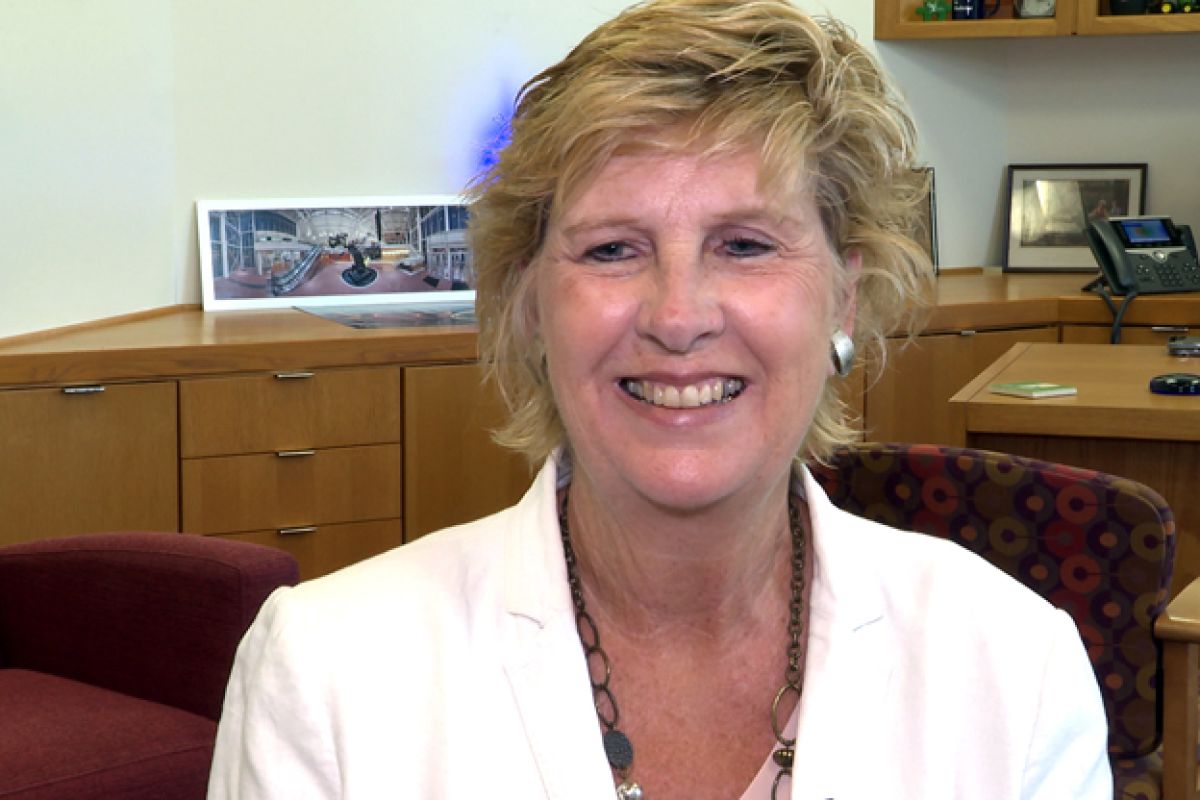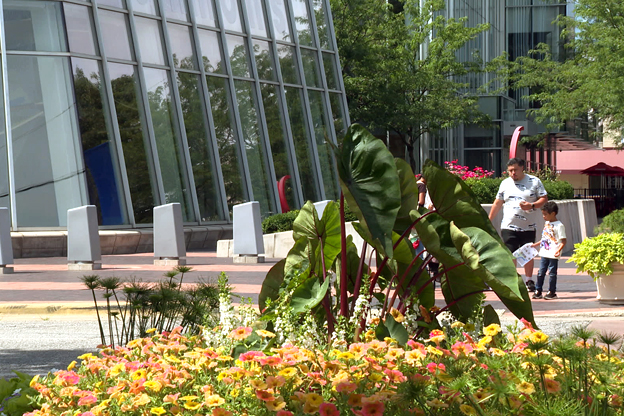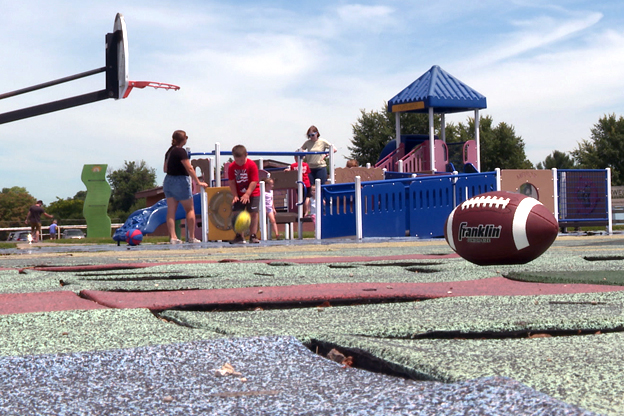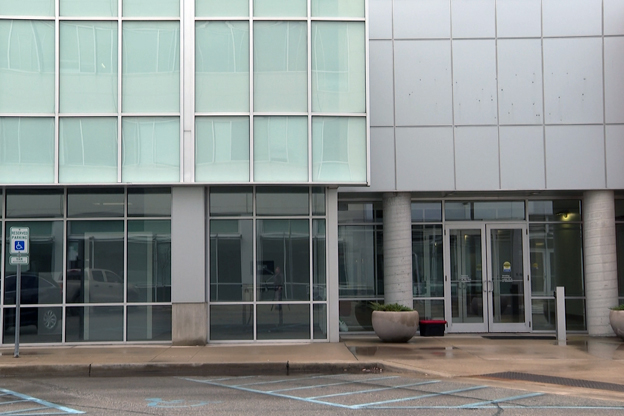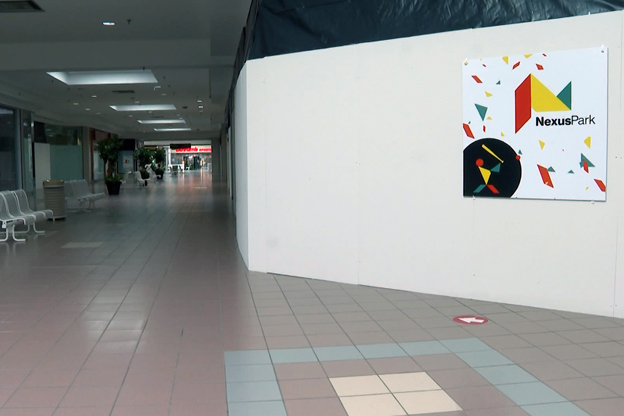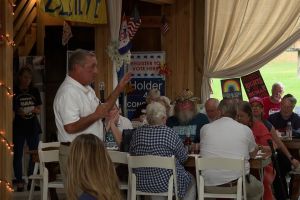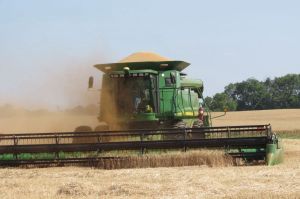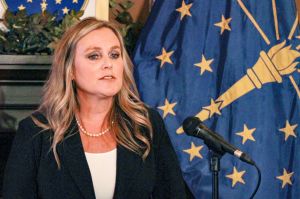Alright. Hello and welcome to ask the mayor on WFIU. I'm Joe Hren from WFIU WTIU News. This week, we're in Columbus. Mayor Mary Ferdon. Hello, welcome. Thanks for being on the show.
Unknown Speaker
Well, thank you and happy July.
Speaker 1
Yes. It's good to see you. I think I was on vacation. You were out. We had some scheduling things. I think there was an election to there. Right. So it's, it's nice to be back in Columbus. It looks great. little warm. And I hear that you didn't have the storms that we had in Bloomington? No,
Speaker 2
we did not. We were pretty fortunate. And I think we had a little bit of rain and wind, but we're surprised to hear that Bloomington is still dealing with a lot of damage. So sorry to hear, but um, hopefully, our, our Columbus DPW can help some.
Unknown Speaker
That's what I hear. So you called Mayor Kerry Thomson. Right.
Speaker 2
I reached out to Kerry and just said, you know, I apologize, because I didn't realize how badly that you've been impacted and offered some help. And she took me up on it. So yesterday and today, and I don't know for how long we have some trucks and some, some staff over there helping pick up storm damage. So it's kind of the Pay It Forward. We've we've had a lot of help from others communities over the years when we have storms or floods. So it's good to it feels
Speaker 1
good to be able to do it. Nice. Nice. Of course, very much appreciated, I'm sure. So you know, we're six months into your first year of your first term of Mayor of Columbus. And, you know, it's kind of a milestone. How's it going so far, six months in? I mean, do you feel like that things are going in the direction that you want them to? Yeah,
Speaker 2
it's been a great six months, and a bit, it's been a busy six months, I keep waiting for the downtime and never comes. Right now. I think we're kind of in the midst of a lot of studies, we we have a housing study that we started earlier this year. RDG is doing it, I think they did the housing study for Bloomington in the past couple of years. So we should have the reports from that in late August. So we're looking forward to that. We just started a public transportation survey, and report our study. And so we're going out to the community trying to get their, their buy in and their thoughts on where we want our transit system to go. We just finished a performing Heart Study. And we're just starting a Columbus downtown 2030 study. So we're kind of in the midst of grabbing a lot of information. It seems like that there's a lot going on in the community. There's a lot going on in economic development wise. And so we're gathering data to move forward on a lot of areas. When
Speaker 1
you talk about the housing study. I know it's something we talk about, with every mayor on this show and just Brandon sack button in Terre Haute to that it's not that you know, you need housing, right? You're really looking at what kinds of housing and maybe where the housing can go. I mean, there's a lot of details, I think, right?
Speaker 2
Looking, it's very, very broad. There's a huge spectrum of housing, and we talk a lot about affordable housing that we need. But we also need housing that's a little bit more expensive. Oftentimes, as people make more money throughout their career, they want to move up, they want a little bit more room with their kids and their families. And so you you can't just focus on one area, though we know that affordable housing is a big need. And we have actually a couple of developers, a number of developers, we're talking about some developers we're working through with tax abatements with other other incentives to financing, hopefully helping them get some tax credits and moving forward. So yeah, we've we've spent a lot of time and energy both from staff and city council moving trying to move that forward. But it's a it's a big piece, and it's something that every community struggles with and with construction costs going up. It's it's something that we've got to figure a way how to do it. And
Speaker 1
that's what Terre Haute is working on is all that the incentives right? How do you get the money to buy that or build that infrastructure? Get contractors to come in to build, right?
Speaker 2
We have we have a few tools, you know, we can use TIF dollars, we can use tax abatements, this state of Indiana passed something called pilot Reese several years ago called payment lieu of taxes. So you can help a developer by reducing the taxes that they have to put it back into the into the development for affordable housing. So there's a lot of things that you can do. It's just trying to make sure that each each element is a little different what they need. So yeah, it's it's it but it's worthwhile because it's having a safe and accessible and home is something that we all miss. It's something we aspire to.
Speaker 1
And you talk about a transit study too, of course, people think about I mean, you do have a bus system, right? But transit is much bigger than that roads and trails bikes,
Speaker 2
right? Yeah, it's all encompassing our, our specific study is around the the Columbus system that we have. And part of it is we do have a lot of people who live here who, too don't drive or who can't drive, we also do push the pedestrian and the biking piece. But a lot of people can't take that to work. We also know that we have a lot of seniors who need to get who needed to get to medical appointments, they need to get to a jobs. And so how can we? How can we build a transit system that accommodates so many different needs? And we've, you know, we've had a bus system for decades, and what can we do differently? And how can we be more user friendly and think outside the box? So that's the intent there.
Speaker 1
Just read was it last week, Cummins planning to lay off workers to streamline their operations? Or is that something you're concerned about? Or you're in the loop about?
Speaker 2
Yeah, I think we're in the loop. I mean, we've come. You know, Cummins has been here for 100 years, right. So we've seen some of the ups and downs and understand that there's times that they need to align their workforce, it's always difficult to watch that happen. Both from an economic development perspective, as well as just a personal because, you know, the affected individuals, and hopefully, they can stay here and find a job we hate to see them have to leave. But you know, Cummins has always been a great partner and such a great employer. So hopefully, we believe that they will, they always will reduce their workforce as little as they have to.
Speaker 1
And of course, we don't know how many that would be. But does the city have some type of workforce development that people who are laid off can try to find new new work, Cummins
Speaker 2
works very hard with whenever this happens, they work very hard with their employees to help them find new jobs.
Speaker 1
We had an email from Allison started a petition on change.org Calling on the Columbus Parks and Recreation Department to address the deteriorating condition of freedom field, which the city didn't respond to, and came out and fixed some of the items that they were concerned about. Give us a little about the history of that park and what the city is doing to help improve it.
Speaker 2
Right. And it's technically not a park, I don't that makes it okay, it's a playground, right. And it's actually attached to Parkside school, one of our elementary school, and a number of actually parents. And I think it's 17 or 18 years old. Now, they got together and wanted to build a playground that was inclusive that kids that kids could use, and children with disabilities can use. And so the community raised a lot of funds to build that 1718 years ago. But yes, it's at the place where it's, it's inlined, for a lot of improvements. The there was a lot of tiles that were missing and needed to be fixed. So you know, we should have and we did fix that we've been in contact with the designer, we'll probably bring them back in and look at the design, it may be time to kind of update a lot of the playground. I appreciate that group of, of I think it's moms coming together and doing that. Right. There's manpower. And so because it will be a public private partnership, we will need to raise some funds from the community to help do that. But yeah, the city understands that we need to be the city and the school will both need to be putting some funding there. How
Speaker 1
does that work with the city parks and recreation to keep track of all of these parks of when they need upgrades or when there are issues with them?
Speaker 2
Well, it's a big job, we have over 1000 acres of parks and playgrounds, and they all have priorities, right. And sometimes they just they're parks that are fairly small, and they just need to be mowed. But oftentimes, they have infrastructure like a playground, or the tower of mill race, or just a wide variety of things that need to be kept up. And, you know, like any other city, we just can't commit the type of dollars that we need. So we asked the Parks Department to just give us a list of priorities every year. And then we work around the priorities. And if something like freedom field comes to the top of the list, we move things around and make sure that it happens.
Speaker 1
Last time I was here a few months ago, we were talking about the city looking at a new place to put a conference center. And I know recently I read where the city did buy the was at the former Sears building. So is that kind of anticipating perhaps a new conference center? Or what's the city looking at there? So
Speaker 2
great question. So we just started recently, I think a study called Columbus downtown 2030 Because there's a number of properties like the former Sears building that I say they're in play that that they've they've recently been purchased by either the city or another entity trying to figure out like, what do we want our downtown to look like over the next 510 15 years. So we the redevelopment commission did purchase the former Sears building, it was purchased, actually, after Sears by Commons and then they sold it to the city. And we that's part of the discussion that we're having over the next year is like, what do we envision putting it at Sears, the former Sears could it be a conference center which we've talked about Prior to COVID, we were online to build a new Hotel Conference Center in downtown Columbus, when the hospitality industry shut down a little bit during COVID. We put that on hiatus. But we still believe that there's a need for it and that we can use it. So, you know, who knows. But now we have that property. So there's a lot of opportunities from this study to see what what the community wants and what we think would make sense there. And
Speaker 1
I was just thinking about parks too. And I forgot to ask maybe the obvious question about Nexus Park, because last time, I think maybe I met you over there, and we got a full tour of it. It's gorgeous. Things go on. Okay. They
Speaker 2
are, as you can imagine, it's full steam ahead. So we, we did another ribbon cutting recently and for the park space, so all of our parks department has moved over from Donner center to Nexus Park. And so you know, they're trying to fit into their new space. We've been using the Fieldhouse a lot. We've got a lot of tournaments scheduled, we've, we've had play days, we have soccer, we have basketball, we have pickleball, IU Columbus had their graduation ceremonies there. So that was that was fun to see that happen. So yeah, we're full steam ahead. And now we're working on the external campus, which includes the to Erica Park and the mile walking track, and the parking and landscaping all of that which we hope will be done by the years. And so it's been a long journey, but very, very excited. And we're beginning to see the use on that. Yeah,
Speaker 1
that after Yeah, it's just like you said, and you were with the city before being mayor, of course, who haven't you seen this whole process happen?
Speaker 2
That's right. Yeah, it's been a long, we purchased the property in 2018. So we're in year six. So of course, what happens is when you move in, then you still have to start tweaking everything that you you weren't sure if it was going to work or not. And my word to everybody is, it's just it's an it's an it's evolution, right. Like we're gonna see, we thought we would use it in one way. And we're going to use in a different way. And the the, the walkers still love their walking track internally. And the the CRH physician office pieces seems to be going really well. So yeah, we're very pleased. But there's still more more work to be done.
Speaker 1
Are you seeing commercial entities drawing into the commercial places in the mall to now or is it still pretty empty?
Speaker 2
It's we're now we've got a couple of tenants who are working through the lease, we've got a couple new ones who are still Mother Bears is still not open. Right? We want to get that open. But yeah, we're beginning to see more in impact. A lot of potential tenants wanted to wait and see what kind of number of people that were coming through. Right. So so we're beginning to get that data.
Unknown Speaker
So what happens with data park now?
Speaker 2
Donner Park, the the building itself is empty. Now we have actually used that we've used that for a cooling center a number of times recently. The park, of course, is still being used. So the goal or the the next phase of this will be to doing a master plan of Donner Park and Donner center. We had hoped to get that to that this year. But you know, park staff is really overwhelmed and overloaded getting moving into Nexus Park and some of the other work that they've been doing. It's in the middle of, you know, their busiest season. So that probably won't start till sometime next year. But yeah, we'll be doing a master plan of that.
Speaker 1
I don't have to get going. I wanted to get this question. And that really quick to the city was, is working with United Way for county homelessness initiative. And it's something you know, we talked about in Bloomington Edzard been another issue of an encampment that needs to be moved within a month. Sometimes it just seems like they're just moving from one place to another, you know, and not really fixing the issue. What's happening here? And how is the city trying to help the homelessness?
Speaker 2
So I don't know if we talked about it earlier if you just read about it. But yes, so we approached a United Way. Mark Stewart, who is the President has a history of working in housing and from Indianapolis, and he's been with us with United Way for many years. And so he kind of embraced our requests, which is can we ask you now to weigh to help us as a community figure out next steps. So he's been having a number of stakeholder, he's had some public sessions where we've had, I think we had 100 People at the last one a couple of weeks ago. And he's doing a lot of kind of stakeholder interviews, talking with many organizations within the community, who actually provide services to to people who are homeless, and then he'll come back to the city with with recommendations for the next steps. And so I'm assuming we'll get that late this summer, first part of the fall. So they're moving full steam ahead. They talked about it recently at their United Way, annual meeting. So we're very appreciative of the work they're, they're done. And we think that they're the right people to help us kind of work through the next what what what we should be doing as a community.
Speaker 1
And for from what I've heard from so many different people, having so many stakeholders involved is so important to this, isn't it? It
Speaker 2
is because oftentimes, those stakeholders of Social Service Agency are are helping the same people but they're not Connecting. So getting them all in the same room. And actually, our United Way has been doing that for many years, they have weekly meetings where they'll, they'll, they'll, they'll discuss the needs that different families or different entities have. And so getting them together working on the the homeless, well, how we can help the homeless, because in a community, our size, and probably even Bloomington size, it's not so overwhelming that we can't help people individually. And that's kind of our goal is being able to identify what what individuals and families need, rather than treating them as one group because everybody has, you know, different reasons why they are homeless, and then there's probably different solutions, how to get them out of it.
Speaker 1
Thank you so much. I'm at a time but I always like to leave the last minute to you. Do you have any announcements or things that I missed that you'd like to tell everybody?
Speaker 2
No, it's just we've we've had a great six months and I'm just so appreciative of the community that support they're giving to me and my administration and the work that we're doing, like I said, we're doing a lot of studying and research now, which I know can be annoying. And the I guess the last word would be please be patient with all of our orange cones. I promise that everything will be better when we finish our construction.
Speaker 1
orange cones is that road cars that's right are everywhere. It seems that way. That time of year. Thank you so much. Hope to see you next month. I appreciate it.







